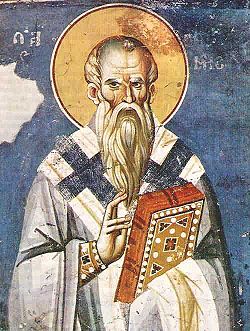[A word of caution: ancient problems are not always our problems, so what they look at will not always address 1800 years of advancements]
1)Clement of Rome to the Corinthians--
A book almost accepted as Scripture by the early Church, it is one of the most produced non-biblical manuscripts dating to slightly after St. Paul in about 80-85AD. The head bishop of Rome, already in this book we see the trend of abuses and questions of conduct being sent to Rome or addressed by Rome. The abuse here in a phrase was that young members of the assembly ousted the older priests and instituted themselves as priests of that community.
Clement corrected the abuses in Corinth with this (and his 2nd) letter and strengthened the precedent of Rome being involved in other affairs. The history is not always clean, but it is also important to note that the "martyrology" played a big role in cities. If an Apostle or great saint was martyred in your city it was a sign of authority (because they taught there) and a belief that that saint was one who prayed and watched over that city. In this case Rome was where Peter and Paul were martyred, something respected widely in the early Church.
 |
| Pope St. Clement I, a "principal" figure who had to call the Corinthians to his office in one of the most famous non-canon letters of all time. |
2) Ignatius of Antioch
Already an old man when he wrote (maybe 70) he wrote to various cities as he himself was instructed by St. John and a friend of his. John died around 100-105AD (aged, perhaps, 89-95). He defended the Church and, as you can see in my signature, was the first to utter the word "catholic" to describe the Church. Now I've attended the services of other denominations who have "one, holy, catholic (Christian), church." It may be worth reflecting on the man who used this word first and how it was used. As you can see from my quote it's different than you might expect. He was taken from his home where he presided in Antioch and was fed to lions in Rome at what was believed to be the Flavian Amphitheater.
 |
| “I am the wheat of God. Let me be ground by the teeth of the wild beasts, that I may be found the pure bread of Christ.” |
Prominent early theologian who shaped much of biblical interpretation and was also a brilliant scholar in many fields. He wanted to die of martyrdom (you read this in "Subtle Crosses"). He was not sainted because some of his theology became suspect. An early example of a great mind in the Church who was lauded and used, but whose own personal piety was particularly severe. Though not proven, it was rumored that he took the Scriptures "if it causes you to sin cut it off" and, as such, he castrated himself. Not sure if that's true, but he was a very severe ascetic who had a profound influence.
His expert learning was also an occasion for him to write elaborate commentaries on Scripture in an attempt to blend and synthesize Scripture in its literal (the truths being expressed), moral (how we apply it), and allegorical senses (truths derived from Scripture as they are found in events, history, and geography--but my explanation fails to capture it exactly).
 |
| Also worth noting is that Origen pioneered the posture many philosophy and theology students would adopt for centuries after. |
4) Eusebius (I will probably write on him later)
2nd-3rd century father who was the first Church historian who made a comprehensive history of Jewish patriarchs to Christ, the Apostles, and the bishops they ordained.
Somewhat dry but somewhat like the James Monroe of the Church who wrote a sort of "Federalist Papers" in that he charted how the canon of Scripture was decided upon and why and many other early traditions and their origins in Scripture and the teachings of the Apostles.
Not the easiest read, but I'm slowly getting through him myself.
 | |||
| He's about as exciting as he looks in this picture, but it doesn't detract from his invaluable research, learning, or importance in understanding the early Church |
I hope this inspired someone to pick one of these men (and there are plenty others) up.
M
No comments:
Post a Comment